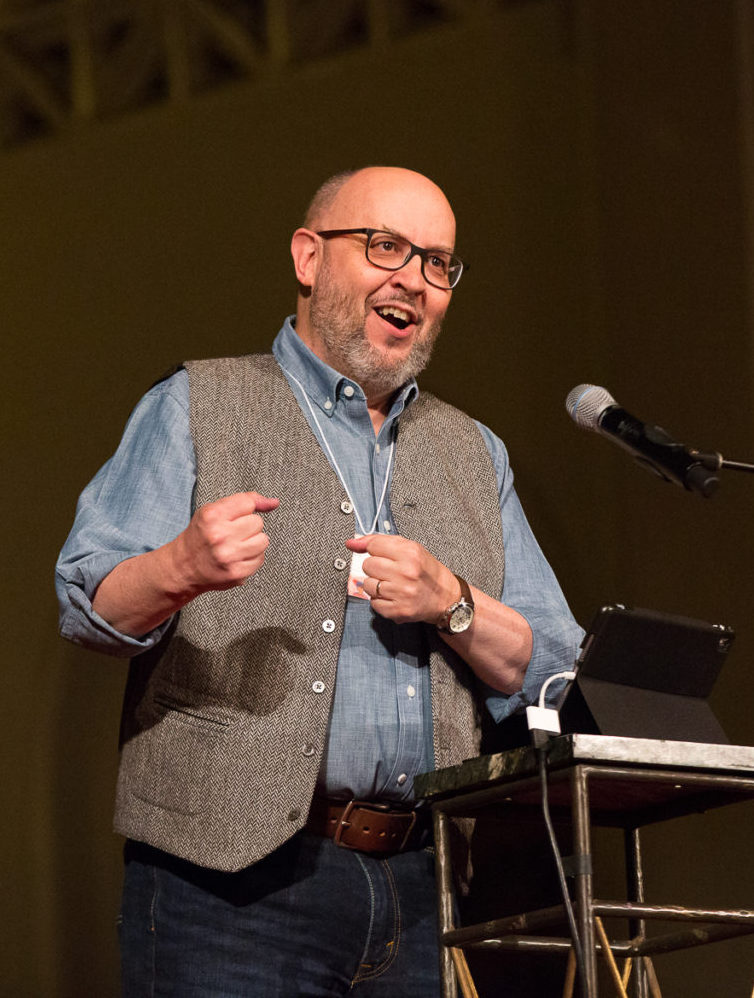
We were so honored to have Alan Jacobs, esteemed author of How To Think (and many other books), speak at our 2018 New York Conference and are doubly grateful that he’s allowed us to post an excerpt from his second talk, delivered on Saturday, April 28th.

The world really does seem different now; there are, in many Western nations, legal as well as social impediments to active religious belief and practice; it is hard to see a way back to some earlier state of affairs at which (supposedly) it was easier to believe and easier to display one’s belief in the public square. The point might be argued; but let’s not argue it. Let’s assume that there really isn’t a way back for religious believers in the West and especially in America. Might there, though, be a way forward? And if so, what would it look like?
We’re not going to be able to do this unless we are the kind of people who can do this kind of thing. But what does that mean? To answer, I’m going to read you a Gospel lesson and preach you a sermon. (Just think of it as the Revenge of the Laity.) My text comes from Luke 9 — plus the cognate passages in the other synoptics — where Jesus commissions the twelve. Our predecessors, that is. Let’s look at the basic structure of the narrative at this key transitional moment in the Gospels.
- Jesus commissions his followers, explaining to them what their job is
- Jesus does great miracles (feeding the five thousand)
 Jesus is glorified on the Mount of Transfiguration
Jesus is glorified on the Mount of Transfiguration- Jesus returns from the mountain and “sets his face towards Jerusalem,” warning his followers what is to come
So that’s what Jesus does. What do his disciples do?
- The leader of them gets really excited about being on the mountain and wants to stay there
- Later he “takes Jesus aside and rebukes him” for all this talk about going to his death
- They argue about which of them is coolest and best
- They don’t understand his talk about death and are afraid to ask him what he means
- They get really mad when they see someone else healing people in Jesus’s name and want to stop that bad person
- They also get really mad when people in a town won’t listen to Jesus and want to call down fire from heaven and blast those chumps to cinders because isn’t that what prophets do (Elijah did it, after all) and we’re, like, way better than Elijah now, right?
So basically Jesus has chosen as his followers a bunch of seven-year-olds. He wants them to preach, heal, and embrace patiently the suffering that accompanies following Him. They, by contrast, want to be victorious, receive praise, and smack down people they feel disrespect them or want to muscle in on their territory. (In the next chapter they want to destroy a Samaritan village because the inhabitants wouldn’t listen to Jesus, but he again “rebukes them.”) The contrast between what He wants and what they want could scarcely be more dramatic.
I especially want to zero in on the the Twelve’s love of policing the people they think of as their enemies, because, as my friend Freddie de Boer says, these days everyone’s a cop. In my talk yesterday I explained why I think the characteristic sin of our moment is not lust or anything else sexual but rather wrath, and the Twelve exemplify that. Rather than doing what they’re told to do, which requires being loving towards others and the conquest of their own fear and pride, they are continually attentive to what they think everyone else is doing wrong, whether it’s ignoring Jesus or following Him from the wrong social location.

This is a problem throughout the Gospels. Disciples and lookers-on alike are far more interested in other people and what God is going to do to those other people than to the state of their own souls.
- People ask whether many will be saved or only a few, and Jesus replies, Why don’t you work on entering through that narrow gate?
- They ask whether those people the Tower of Siloam fell are were especially bad sinners and Jesus says, They were no worse than you.
- When Jesus tells Peter how he will die, Peter says, “Well, okay, but what about John?” — to which Jesus replies, What is that to you? How is that any of your business?
- And, to cover the whole general phenomenon, Jesus ask, Why are you worried about the specks in other people’s eyes when you have logs in your own?
And the answer is clear: we really and truly believe that we’re the ones with the specks and they’re the ones with the logs. But Jesus tells us otherwise. Why don’t we try believing him and see how that works? How about if we
- preach
- heal
- train ourselves to bear patiently whatever suffering comes our way as followers of Jesus
- pray for the logs to be removed from our eyes
- and then, if we have any time left over but not otherwise, worry about policing other people. How about that? Can we agree to that?
I am absolutely convinced that unless we get this matter straightened out, until we learn to get beyond the pre-adolescent attitudes of the Twelve, we will not be able to plant the seeds of spiritual renewal.

COMMENTS
One response to “Seeds of Renewal (According to Alan Jacobs)”













[…] Year of Our Lord, 1943: Christian Humanism in an Age of Crisis, by Alan Jacobs […]